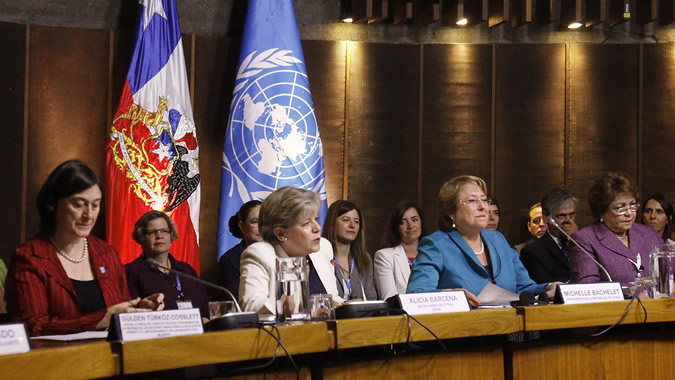Nearly 50% of Paid Jobs Held by Women in the Region Are Precarious
Work area(s)
A new report by ECLAC, which evaluates two decades of gender equality policies, was presented at an event inaugurated by Chilean President Michelle Bachelet.

(18 November 2014) Almost half of the women in Latin America and the Caribbean (47.7%) who have paid work are employed in low-productivity jobs that offer little social protection (as domestic workers, independent contractors or in companies of up to five employees), according to a report released today by the Economic Commission for Latin America and the Caribbean (ECLAC) during a Special Session on Beijing+20 in which Chilean President Michelle Bachelet participated.
The document was presented by ECLAC’s Executive Secretary, Alicia Bárcena, at an event in Santiago, Chile, in which the other speakers included Alejandrina Germán, the Dominican Republic’s Minister of Women’s Affairs and President of the Presiding Officers of the Regional Conference on Women in Latin America and the Caribbean, as well as Gülden Türköz-Cosslett, Officer-in-Charge of the Policy and Programme Bureau of the United Nations Entity for Gender Equality and the Empowerment of Women (UN-Women).
On average, the rate of economic activity among females in Latin America is only 49.8%, and one in every three women in the region has no income of her own, according to the report. Meanwhile, the amount of time that women dedicate to unpaid work is at least double that of men. “The burden of unpaid work reduces women’s participation in decision-making and limits their professional progress and occupational options, which in turn reduces their income and their prospects for accessing social protection,” the document states.
The Special Session on Beijing+20, which ends tomorrow, is being held in the framework of the 51st meeting of the Presiding Officers of the Regional Conference on Women in Latin America and the Caribbean, in which participants include ministers of women’s affairs, international officials and civil society representatives from the region.
“In these 20 years we have seen significant progress for women in many aspects, but we have also seen setbacks, regional differences and difficulties in relevant areas due to the emergence of new forms of discrimination. This requires that we redouble our efforts,” said Chilean President Michelle Bachelet, who pointed to the convergence of the struggle for equality with the struggle for democracy.
The President referred to some of the measures her government has taken to eliminate gender gaps, underscoring that, for example, women in Chile represent just 16% of legislators in both houses of Congress, compared with the regional average of 26%.
Executive Secretary Alicia Bárcena praised the agreements reached by countries in the context of the Regional Conference on Women in Latin America and the Caribbean (a subsidiary body of ECLAC), especially during the most recent meetings in Quito (2007), Brasilia (2010) and Santo Domingo (2013). “Today we call on governments and civil society to join forces and avert setbacks,” especially now that the gender perspective must be included in all aspects of the post-2015 development agenda, she stressed.
The senior official said that “in these 20 years the labor market structure has not changed and in light of data on the distribution of time between women and men, it is clear that women have assumed the costs of labor participation on an individual basis.” She emphasized that women’s paths to economic autonomy must be strengthened and gains made in terms of physical autonomy and decision-making must be consolidated further.
Gülden Türköz-Cosslett, of UN-Women, said she was confident that this meeting in the Chilean capital would enable the region to provide articulated shared views and powerful messages and demands at the 59th session of the Commission on the Status of Women (scheduled for March 9-20, 2015, at the UN headquarters in New York). “As in previous years, we count on Latin America and the Caribbean’s constructive leadership,” she said.
Meanwhile, Minister Alejandrina Germán called for “continued progress, promoting the incorporation of the women’s agenda in the Sustainable Development Goals (which will replace the Millennium Development Goals starting in 2015) to achieve autonomy among women and full equality between men and women in the economic, social, political and cultural spheres.”
More information:
Related content
Special session on Beijing+20 in Latin America and the Caribbean
Opening remarks by Alicia Bárcena, Executive Secretary of ECLAC.
20 años de transformaciones hacia la igualdad
Presentación de la Secretaria Ejecutiva de la CEPAL, Alicia Bárcena, en la Sesión especial sobre Beijing + 20 en América Latina y el Caribe.

Fifty-first meeting of the Presiding Officers of the Regional Conference on Women in Latin America and the Caribbean
The Presiding Officers of the Regional Conference on Women in Latin America and the Caribbean held their fifty-first meeting from 17 to 19 November 2014 in Santiago.
Related link(s)
Country(ies)
- Latin America and the Caribbean
-
Chile
-
Dominican Republic
Contact
Public Information Unit
- prensa@cepal.org
- (56 2) 2210 2040
